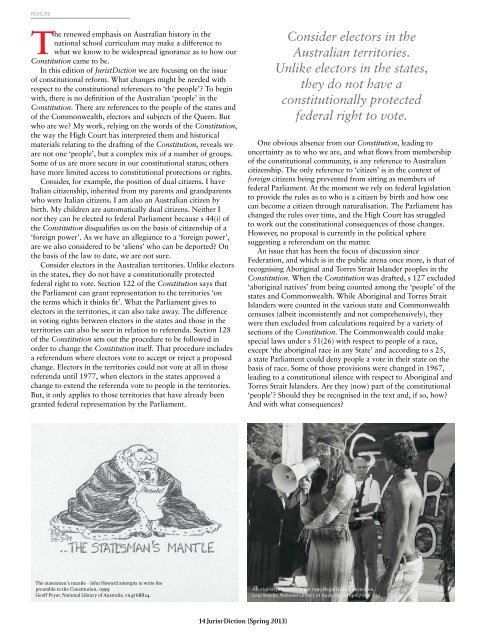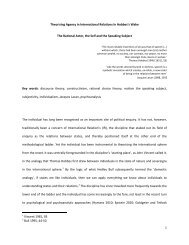PeoPLe, PoLicieS And PLebiSciteS: reforming the conStitution
PeoPLe, PoLicieS And PLebiSciteS: reforming the conStitution
PeoPLe, PoLicieS And PLebiSciteS: reforming the conStitution
You also want an ePaper? Increase the reach of your titles
YUMPU automatically turns print PDFs into web optimized ePapers that Google loves.
feature<br />
feature<br />
The renewed emphasis on Australian history in <strong>the</strong><br />
national school curriculum may make a difference to<br />
what we know to be widespread ignorance as to how our<br />
Constitution came to be.<br />
In this edition of JuristDiction we are focusing on <strong>the</strong> issue<br />
of constitutional reform. What changes might be needed with<br />
respect to <strong>the</strong> constitutional references to ‘<strong>the</strong> people’? To begin<br />
with, <strong>the</strong>re is no definition of <strong>the</strong> Australian ‘people’ in <strong>the</strong><br />
Constitution. There are references to <strong>the</strong> people of <strong>the</strong> states and<br />
of <strong>the</strong> Commonwealth, electors and subjects of <strong>the</strong> Queen. But<br />
who are we? My work, relying on <strong>the</strong> words of <strong>the</strong> Constitution,<br />
<strong>the</strong> way <strong>the</strong> High Court has interpreted <strong>the</strong>m and historical<br />
materials relating to <strong>the</strong> drafting of <strong>the</strong> Constitution, reveals we<br />
are not one ‘people’, but a complex mix of a number of groups.<br />
Some of us are more secure in our constitutional status; o<strong>the</strong>rs<br />
have more limited access to constitutional protections or rights.<br />
Consider, for example, <strong>the</strong> position of dual citizens. I have<br />
Italian citizenship, inherited from my parents and grandparents<br />
who were Italian citizens. I am also an Australian citizen by<br />
birth. My children are automatically dual citizens. Nei<strong>the</strong>r I<br />
nor <strong>the</strong>y can be elected to federal Parliament because s 44(i) of<br />
<strong>the</strong> Constitution disqualifies us on <strong>the</strong> basis of citizenship of a<br />
‘foreign power’. As we have an allegiance to a ‘foreign power’,<br />
are we also considered to be ‘aliens’ who can be deported? On<br />
<strong>the</strong> basis of <strong>the</strong> law to date, we are not sure.<br />
Consider electors in <strong>the</strong> Australian territories. Unlike electors<br />
in <strong>the</strong> states, <strong>the</strong>y do not have a constitutionally protected<br />
federal right to vote. Section 122 of <strong>the</strong> Constitution says that<br />
<strong>the</strong> Parliament can grant representation to <strong>the</strong> territories ‘on<br />
<strong>the</strong> terms which it thinks fit’. What <strong>the</strong> Parliament gives to<br />
electors in <strong>the</strong> territories, it can also take away. The difference<br />
in voting rights between electors in <strong>the</strong> states and those in <strong>the</strong><br />
territories can also be seen in relation to referenda. Section 128<br />
of <strong>the</strong> Constitution sets out <strong>the</strong> procedure to be followed in<br />
order to change <strong>the</strong> Constitution itself. That procedure includes<br />
a referendum where electors vote to accept or reject a proposed<br />
change. Electors in <strong>the</strong> territories could not vote at all in those<br />
referenda until 1977, when electors in <strong>the</strong> states approved a<br />
change to extend <strong>the</strong> referenda vote to people in <strong>the</strong> territories.<br />
But, it only applies to those territories that have already been<br />
granted federal representation by <strong>the</strong> Parliament.<br />
Consider electors in <strong>the</strong><br />
Australian territories.<br />
Unlike electors in <strong>the</strong> states,<br />
<strong>the</strong>y do not have a<br />
constitutionally protected<br />
federal right to vote.<br />
One obvious absence from our Constitution, leading to<br />
uncertainty as to who we are, and what flows from membership<br />
of <strong>the</strong> constitutional community, is any reference to Australian<br />
citizenship. The only reference to ‘citizen’ is in <strong>the</strong> context of<br />
foreign citizens being prevented from sitting as members of<br />
federal Parliament. At <strong>the</strong> moment we rely on federal legislation<br />
to provide <strong>the</strong> rules as to who is a citizen by birth and how one<br />
can become a citizen through naturalisation. The Parliament has<br />
changed <strong>the</strong> rules over time, and <strong>the</strong> High Court has struggled<br />
to work out <strong>the</strong> constitutional consequences of those changes.<br />
However, no proposal is currently in <strong>the</strong> political sphere<br />
suggesting a referendum on <strong>the</strong> matter.<br />
An issue that has been <strong>the</strong> focus of discussion since<br />
Federation, and which is in <strong>the</strong> public arena once more, is that of<br />
recognising Aboriginal and Torres Strait Islander peoples in <strong>the</strong><br />
Constitution. When <strong>the</strong> Constitution was drafted, s 127 excluded<br />
‘aboriginal natives’ from being counted among <strong>the</strong> ‘people’ of <strong>the</strong><br />
states and Commonwealth. While Aboriginal and Torres Strait<br />
Islanders were counted in <strong>the</strong> various state and Commonwealth<br />
censuses (albeit inconsistently and not comprehensively), <strong>the</strong>y<br />
were <strong>the</strong>n excluded from calculations required by a variety of<br />
sections of <strong>the</strong> Constitution. The Commonwealth could make<br />
special laws under s 51(26) with respect to people of a race,<br />
except ‘<strong>the</strong> aboriginal race in any State’ and according to s 25,<br />
a state Parliament could deny people a vote in <strong>the</strong>ir state on <strong>the</strong><br />
basis of race. Some of those provisions were changed in 1967,<br />
leading to a constitutional silence with respect to Aboriginal and<br />
Torres Strait Islanders. Are <strong>the</strong>y (now) part of <strong>the</strong> constitutional<br />
‘people’? Should <strong>the</strong>y be recognised in <strong>the</strong> text and, if so, how?<br />
<strong>And</strong> with what consequences?<br />
Following <strong>the</strong> election of <strong>the</strong> minority Commonwealth<br />
Labor government in 2010, an agreement was reached between<br />
Labor and <strong>the</strong> Greens which included working towards <strong>the</strong><br />
calling of a referendum to recognise Aboriginal and Torres<br />
Strait Islander peoples in <strong>the</strong> Constitution explicitly. The<br />
government convened an Expert Panel to consider <strong>the</strong> issue and<br />
<strong>the</strong> Panel reported to Parliament after extensive consultation.<br />
The Panel made a series of proposals, including: removal<br />
of all references to ‘race’ from <strong>the</strong> Constitution, inserting<br />
a new section recognising Aboriginal and Torres Strait<br />
Islander peoples and giving <strong>the</strong> Parliament <strong>the</strong> power to make<br />
laws ‘with respect to’ those peoples, a prohibition of racial<br />
discrimination, and a recognition of Aboriginal and Torres<br />
Strait Islander languages while at <strong>the</strong> same time recognising<br />
English as <strong>the</strong> ‘national language’.<br />
Ra<strong>the</strong>r than call a referendum on <strong>the</strong> matter, <strong>the</strong> federal<br />
government introduced legislation to recognise Aboriginal<br />
and Torres Strait Islander peoples. That legislation set up a<br />
review process to encourage more debate and development of<br />
constitutional reform proposals that would be likely to receive<br />
sufficient support in order to be successful in a referendum. Some<br />
of <strong>the</strong> Australian states have also introduced some measure of<br />
recognition within state legislation, but usually in a form that has<br />
only symbolic ra<strong>the</strong>r than legal effect. The federal government<br />
is now investing money into building <strong>the</strong> momentum for<br />
constitutional reform in this area, with <strong>the</strong> work being led by<br />
Reconciliation Australia.<br />
There is no indication, however, that <strong>the</strong> forthcoming (at time<br />
of writing) election will have constitutional recognition as a high<br />
priority. To date, <strong>the</strong> political arena has been overwhelmed with<br />
leadership disputes, debate on asylum seeker policy and on climate<br />
change, and o<strong>the</strong>r concerns. However, <strong>the</strong> issue of constitutional<br />
reform to bring our foundational document in line with <strong>the</strong> reality<br />
of our identity will not go away. We do need to consider how<br />
<strong>the</strong> Constitution reflects <strong>the</strong> historical fact that Aboriginal and<br />
Torres Strait Islander peoples were here, with <strong>the</strong>ir own systems<br />
of law, long before white people. We need to consider whe<strong>the</strong>r <strong>the</strong><br />
Constitution can help us address <strong>the</strong> injustice of non-recognition<br />
and <strong>the</strong> ongoing consequences of that history.<br />
This is only one of a number of areas regarding <strong>the</strong> Australian<br />
constitutional ‘people’ that is worthy of attention. Should<br />
<strong>the</strong>re be constitutional differences between people in <strong>the</strong> states<br />
as compared to people in <strong>the</strong> territories? What constitutional<br />
impact, if any, should flow from dual citizenship? Inclusion of<br />
a constitutional definition of Australian citizenship may not be<br />
<strong>the</strong> answer. However, we do need to understand <strong>the</strong> contours<br />
of what <strong>the</strong> Constitution says about our identity and consider<br />
whe<strong>the</strong>r changes need to be made so that our foundational<br />
document reflects who we, ‘<strong>the</strong> people’, really are.<br />
This is only one of a number of<br />
areas regarding <strong>the</strong> Australian<br />
constitutional ‘people’<br />
that is worthy of attention.<br />
Should <strong>the</strong>re be constitutional<br />
differences between people in<br />
<strong>the</strong> states as compared to people<br />
in <strong>the</strong> territories?<br />
New Australian Citizens swear <strong>the</strong> oath in front of Queanbeyan<br />
mayor Tim Overall centre. Picture by Jeffrey Chan.<br />
Elisa Arcioni is a senior lecturer who<br />
joined <strong>the</strong> Sydney Law School in 2012.<br />
Prior to that she was a lecturer in law<br />
at <strong>the</strong> University of Wollongong and<br />
associate to <strong>the</strong> Honourable Justice<br />
Michael Kirby, High Court of Australia.<br />
FUN, FARE & FUTURE ALUMNI EVENT<br />
The statesman’s mantle - John Howard attempts to write <strong>the</strong><br />
preamble to <strong>the</strong> Constitution, 1999.<br />
Geoff Pryor, National Library of Australia, vn4768824.<br />
Aboriginal protesters at <strong>the</strong> 1999 Republican Convention.<br />
Loui Seselja, National Library of Australia, an14067090-223.<br />
INSPIRED — <strong>the</strong> Campaign to support<br />
<strong>the</strong> University of Sydney will see us raise<br />
$600 million from more than 40,000<br />
supporters.<br />
We are embracing <strong>the</strong> generosity of <strong>the</strong><br />
wider community to invest in <strong>the</strong> future<br />
of Australian innovation and education,<br />
and we want you to be part of it.<br />
sydney.edu.au/inspired<br />
The University of Sydney’s ‘Fun, Fare & Future’ program connects<br />
new international students with local students and alumni, providing<br />
an opportunity to network, share academic, professional and social<br />
experiences, inspire, inform and foster new friendships. If you are<br />
interested in making a positive impact on <strong>the</strong> lives of our students<br />
by hosting anything from a leisurely breakfast or lunch to a cocktail<br />
function, with your family or with fellow alumni, please contact Katerina<br />
Lusinovska on +61 2 9036 9504 or alumni.projects@sydney.edu.au,<br />
or register your interest at sydney.edu.au/alumni/hospitality.<br />
14 Jurist·Diction {Spring 2013} Jurist·Diction {Spring 2013} 15
















